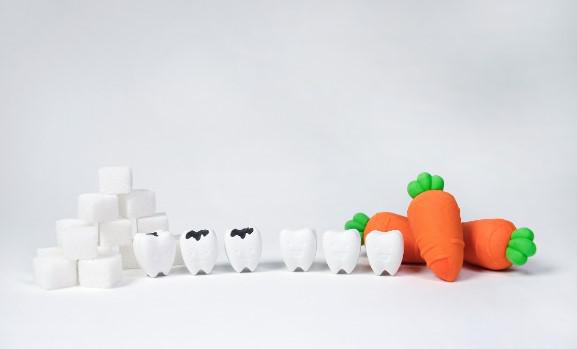
The draw of sugar can be hard to resist, especially this time of year! Whether it’s Aunt Clara’s special holiday cookies or advent calendar chocolates, we’re surrounded by tempting treats from Thanksgiving through New Year’s. We know sugar isn’t “good” for us, but exactly how does it affect our dental health?
Sugar Changes Mouth Acidity – As children, we learn that sugar causes cavities, but the real culprit is acid. Our saliva is naturally acidic, which, when combined with regular tooth brushing, maintains a low PH level that creates a healthy environment for teeth and gums. When consumed, sugar mixes with the natural bacteria in saliva and creates acid, which drives up the PH level to cause a more acidic environment in the mouth. These acid levels can remain elevated for twenty minutes or more and during this time acid begins to eat into tooth enamel, creating cavities.
Sugar Leads to Bacterial Growth – In addition to destroying tooth enamel, the acids that result from sugar consumption also create an ideal environment for bacteria that can lead to gingivitis, gum disease, and receding gums. This occurs when bacteria infect little pockets between the gums and the teeth, causing the gums to pull away and loosen the teeth. In advanced cases, the infection can start breaking down the bone underneath the teeth, causing the teeth to fall out.
Even if you don’t consider yourself to have a “sweet tooth,” it’s difficult to avoid sugar altogether, as it’s added to almost everything. Beyond adding flavor, sugar gives food texture and color, balances the acidity of those containing vinegar and tomatoes, serves as a bulking agent in baked goods and ice cream, and helps preserve foods like jams and jellies. Sugar also fuels fermentation, which is why it’s found in breads and kombucha. Depending on the form used, sugar affects your oral health differently.
Effects of Solid Sugars - Sugar comes in many forms, and one of the most common is white processed sugar (i.e., solid sugar crystals) found in food, gum, and candy. These non-liquid sugars are harmful because they leave a large amount of sticky residue on our teeth that is too strong for saliva to wash away. The adverse effects are made worse by the highly concentrated and processed nature of the ingredients found in popular processed foods.
Effects of Liquid Sugars - Perhaps the most popular and harmful form of sugar is corn syrup. This liquid form of sugar is prevalent in most sodas and sugar-sweetened drinks (including energy drinks). Drinking this form of sugar is essentially like swishing with a toxic mouthwash. Liquid sugar gets into every nook and crevice in the mouth, covering teeth and into gum tissue. As the resulting sticky film sits in your mouth, bacteria begin to breed and acid slowly disintegrates tooth enamel. The same film coats gums, where bacteria can lead to gingivitis and cause bad breath.
As dental experts, we recommended that you avoid sugary drinks and foods whenever possible, but we know that’s not realistic – or desirable – all of the time (especially during the holidays). The best way to have your cake and eat it too (without causing cavities) is to brush your teeth as soon as possible after eating or drinking, especially when those foods or beverages are sweetened with sugar, corn syrup, or other forms of sugar. If brushing isn’t possible, rinse your mouth with water after indulging.
Contact Our Office
Of course, brushing and flossing every day and visiting your dentist at least twice a year is the best way to keep your smile healthy. Contact our dental team to schedule your next cleaning today.


